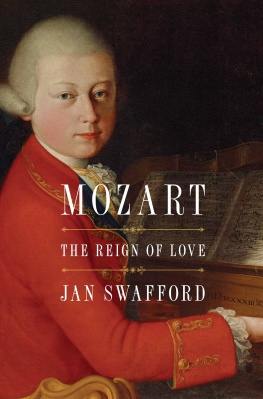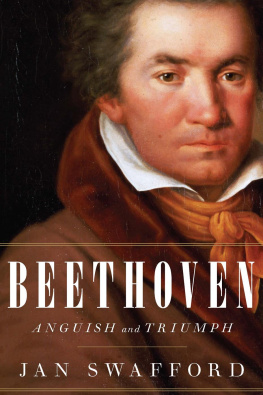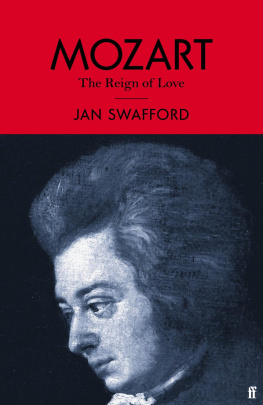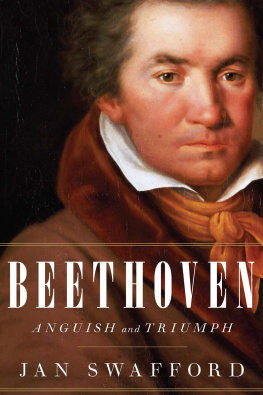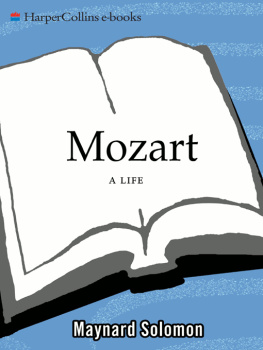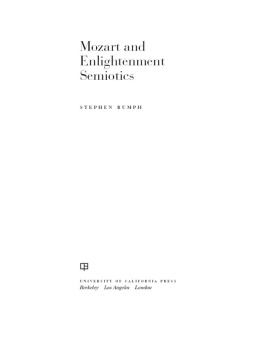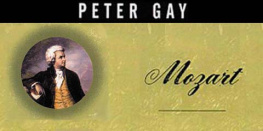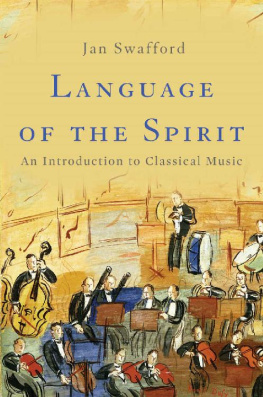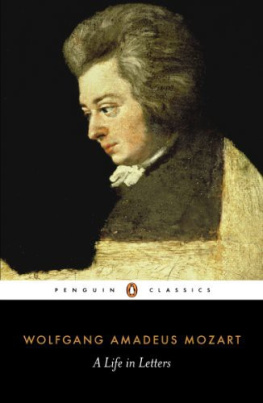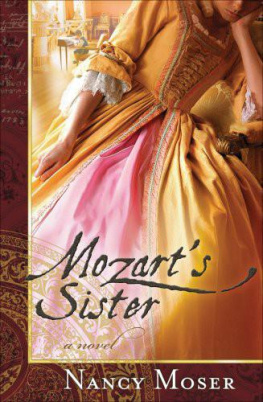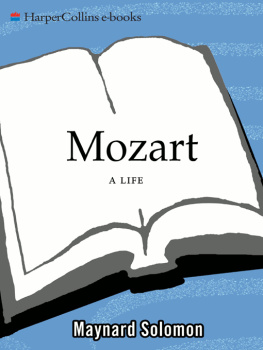Jan Swafford - Mozart: The Reign of Love
Here you can read online Jan Swafford - Mozart: The Reign of Love full text of the book (entire story) in english for free. Download pdf and epub, get meaning, cover and reviews about this ebook. year: 2020, publisher: Harper, genre: Non-fiction. Description of the work, (preface) as well as reviews are available. Best literature library LitArk.com created for fans of good reading and offers a wide selection of genres:
Romance novel
Science fiction
Adventure
Detective
Science
History
Home and family
Prose
Art
Politics
Computer
Non-fiction
Religion
Business
Children
Humor
Choose a favorite category and find really read worthwhile books. Enjoy immersion in the world of imagination, feel the emotions of the characters or learn something new for yourself, make an fascinating discovery.
- Book:Mozart: The Reign of Love
- Author:
- Publisher:Harper
- Genre:
- Year:2020
- Rating:3 / 5
- Favourites:Add to favourites
- Your mark:
- 60
- 1
- 2
- 3
- 4
- 5
Mozart: The Reign of Love: summary, description and annotation
We offer to read an annotation, description, summary or preface (depends on what the author of the book "Mozart: The Reign of Love" wrote himself). If you haven't found the necessary information about the book — write in the comments, we will try to find it.
Mozart: The Reign of Love — read online for free the complete book (whole text) full work
Below is the text of the book, divided by pages. System saving the place of the last page read, allows you to conveniently read the book "Mozart: The Reign of Love" online for free, without having to search again every time where you left off. Put a bookmark, and you can go to the page where you finished reading at any time.
Font size:
Interval:
Bookmark:
IN MEMORIAM
Mordicai Gerstein, 19352019, artist.
Friend, mentor, inspiration, you and your stories helped teach many of us how to live.
P icasso said: Art is a lie that makes us realize truth... The artist must know the manner whereby to convince others of the truthfulness of his lies.
Shakespeare wrote: The truest poetry is the most feigning.
Wolfgang Amad Mozart was in his person a fluent liar when he needed to be because, perhaps, at that moment in his life, as at any moment in his art, he believed in everything he said. Which is to say that I find Mozart to be the kind of revelatory liar Picasso and Shakespeare were talking about. What I have come to feel in my years of living with him is that while he is, as everybody knows, the distillation of what it means to be a prodigy, beyond that he is the distillation of what it means to be an artist, at its most splendid and fundamental. Mozart is among the supreme players in the childish and sublime game of what-if, a soul made for art and for a stage even when he was writing instrumental music. On the death of his friend George Gershwin, Arnold Schoenberg wrote a definition of what I mean: He is a composerthat is, a man who lives in music and expresses everything, serious or not,... by means of music, because it is his native language.
From early childhood, Mozart had the kind of innate understanding of his art that allowed him to speed past obstacles often without realizing they were there. But in the long run, even he had to overcome barriers, including his own facility and his remarkable gift for mimicry. As he came to maturity, his glorious childhood proved as much burden as an advantage. Perhaps the greatest impediment between Mozart the prodigy and what he became in adulthood was the mighty edifice of musical convention in his time. This was a barrier that he lacked the desire or the nature to skirt. He could only forge his way through convention and come out the other side, master of convention but no longer beholden to it. In his art and in his life, Mozart took the status quo largely as a given and then went his own way.
The nineteenth century ginned up his life into a grand Beethovenian tragedy: poverty, neglect, misunderstanding, writing the Requiem for himself, the paupers grave, and so on. That all those stories went against manifest fact was no impediment to the Romantic fancy that to be a genius, you must suffer. To that I say: the myth of the suffering genius collapses with Mozart. Compared with my previous biographical subjects lives, Beethoven and Brahms, Mozart, I found, was by far the sanest, most gregarious, least self-flagellating. (He did, unfortunately, lack Brahmss hardheaded common sense and Beethovens gift for the business of music.) As we will see in the coming pages, while Mozart had his share of sorrow and loss and frustration like the rest of us, he was fundamentally a happy man. He wrote for public consumption, which is to say that he was a professional in a way few composers are anymore. Still, on the whole he did what he wanted to do the way he wanted to, and when he was done he didnt worry overmuch about what the public thought of it.
At the same time, as the nineteenth century rolled into the twentieth, another myth blossomed: to be a certified genius you must be a rebel and an innovator, if not an outright revolutionary. So Mozart sometimes got painted in those terms too. Personally or artistically, the notion of Mozart the revolutionary doesnt stand, though the reasons for that are not simple. Yes, he was unusual and prophetic in being a freelancer, but he was temperamentally unsuited to being any kind of courtier, and if he claimed that he wanted a job as a court Kapellmeister or the like, it is a good question whether that sort of work, with its necessary subservience and bureaucratic demands, would have suited him. Politically it appears that Mozart was progressive in some degree, but we lack any details of his convictions. In any case, there is no indication that he felt rebellious toward the ruling class, among whom were a number of his friends and patrons. It was the actual job of working at a court that chafed him, and he left that kind of job early and permanently.
I am saying, then, that the Mozart we all inherited, suffering penury and writing for posterity, was an invention of biographers. At the same time, I have to admit that as a biographer I have some sympathy with those mythmakers. Who wants to read about a happy man? Well see.
BECAUSE I WRITE MUSICAL BIOGRAPHIES THAT ARE SCHOLARLY IN approach but intended for the broad public, its part of my job to describe my subjects music. There are two problems with this endeavor. The first is that I dont believe its possible to capture music in prose other than in technical terms. As is reflected in the title of another book of mine, I consider music to be a language of the spirit beyond words. I think most musicians feel that way. All the same, I accept the need for trying to evoke the music in a book that aspires to convey the human qualities of my subjects art.
The second problem is Mozarts art. Over the years Ive written several books about music and a good many program and liner notes, and Ive never found another composer who beggars language as Mozart does. Writing about Beethoven in that biography was easier because he was usually engaged in emotions and quasi-narratives that could be articulated, and I think he intended his expression to be relatively transparent. That was not Mozarts game. In his expression he was often involved in shades and subtleties. He did not play with existing formal models to the degree that Beethoven and even Haydn did. Except perhaps in some of Mozarts more or less Sturm und Drang works, there is usually not all that strong a sense of an overall story in a piece. The idea of a work of music as an implied narrative was not in the air until the next century. His works certainly hold together integrally, but it is often hard to examine why they do using the laypersons terms to which I am mostly adhering in the book.
Besides that, a good deal of his music is involved in, sometimes revelatory of, the matter of beauty. Mostly we are not taught about beauty in school because it is perceived as something vague and subjective. Among contemporary artists, beauty has often been regarded as a mushy and bourgeois quality. I believe beauty is real and significant, and central to a perception of Mozart, so Ive tried to deal with it here and there in the book. But again, Mozart is perhaps the most challenging composer of all to capture in words because his work is so intimately bound up in what music can do that is unlike what words can do. Music, to repeat, was his native language. And beauty also largely beggars language.
Once I had a conversation with the fortepianist Kristian Bezuidenhout in which he said, We tend to listen to Mozart with ears trained by Beethoven, and thats not the best way to listen to Mozart. That was a musicianly observation, not a theoretical or philosophical one. But its an insight Ive been aspiring to understand and wield ever since. Thinking about his point, I realized that in order to approach Mozart I had to get out of my head the years I had spent studying Beethovens music. I also had to get out of my head Beethovens assumptions about the role of the composer in his art and in posterity. If Mozart ever thought about the career of his music after he died, there is no record of it. Trying to snare Mozarts work in prose, I searched for something more poetic to convey what is finally ineffable. But Im not a philosopher or a poet, only a musician.
In one respect, Mozart did my prose a favor. At a certain point I noticed that my words were coming out looser, more informal, than in my previous biographies. I was glad to see this, because I try in my tone to reflect something of the personality of my subjects, and Mozart was a jolly and informal manwell, informal given that he was in his lifestyle a dandy and in his art supremely fastidious. Soon I realized why my prose was turning out that way: I was being taken over to a degree by the style of Mozarts letters, which at their most entertaining are effervescent, hilarious, sometimes so obscene that they could clear your sinuses. I laughed more while writing this book than any of my others, much of the time at things Mozart himself had written. I suppose Ill be accused of reveling in his notorious scatology, but in fact Ive reveled in his wit and joie de vivre in whatever mode, and he had many modes of wit. What he reveled in, I revel in.
Font size:
Interval:
Bookmark:
Similar books «Mozart: The Reign of Love»
Look at similar books to Mozart: The Reign of Love. We have selected literature similar in name and meaning in the hope of providing readers with more options to find new, interesting, not yet read works.
Discussion, reviews of the book Mozart: The Reign of Love and just readers' own opinions. Leave your comments, write what you think about the work, its meaning or the main characters. Specify what exactly you liked and what you didn't like, and why you think so.

